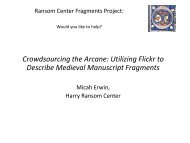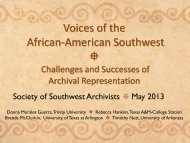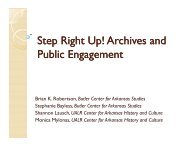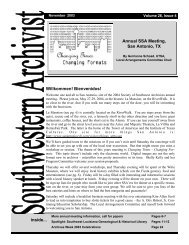May 2006 - Society of Southwest Archivists
May 2006 - Society of Southwest Archivists
May 2006 - Society of Southwest Archivists
You also want an ePaper? Increase the reach of your titles
YUMPU automatically turns print PDFs into web optimized ePapers that Google loves.
Page 16<strong>Southwest</strong>ern Archivist20th -Century Sugar Plantation Documented in LSU CollectionsBy Tara Z. Laver, LSU Libraries Special CollectionsThree important recent donations to the LSU Libraries Special Collections center around Acadia Plantation, a sugarplantation in Thibodaux, La., that until 2003 had been owned and operated by the same family since 1875. Thefamilies associated with Acadia Plantation, the Butlers, Gays, and Platers, boast a distinguished history in the state,producing United States senators and representatives, as well as community, business, and sugar industry leaders. Thedonation <strong>of</strong> the family papers <strong>of</strong> the plantation’s owners and the plantation library late last year concluded three years<strong>of</strong> donor relations that also resulted in the acquisition in 2004 <strong>of</strong> the records <strong>of</strong> the plantation. The latter are nowprocessed and open for research.These materials are a significant addition to the Libraries’ holdings. Twentieth-century, family owned sugar plantationsare increasingly rare, and their records, even harder to come by. Further, as many planting families have done,the most recent owners, the Platers, diversified their land, leasing portions for oil and gas production or selling it fordevelopment. As much as LSU’s thousands <strong>of</strong> antebellum plantation papers document quintessential plantation life,culture, and economy <strong>of</strong> the first part <strong>of</strong> the 19th-century, this later collection tracks the common path <strong>of</strong> the 20thcenturyplantation.The Acadia Plantation Records (1809-2004, bulk: 1940-1979) are comprised <strong>of</strong> 50 linear feet <strong>of</strong> correspondence,financial, legal, and miscellaneous documents, printed items, maps, plats, and photographs, plus an additional 30manuscript volumes and 68 oversize folders. The papers document business and legal dealings <strong>of</strong> the plantation ownersand operators, as well as plantation operations such as sugar cane farming, tenant farmers and their crops, and theplanning and development <strong>of</strong> the plantation lands throughout the 19th and 20th centuries. The LSU Libraries werefortunate that in addition to the donation <strong>of</strong> the records, the owners provided funds to subsidize the processing <strong>of</strong> thecollection. Working under the supervision <strong>of</strong> Manuscripts Processing Librarian Rose Tarbell, Ashley Via and RebeccaSmith, two graduate assistants from the LSU School <strong>of</strong> Library and Information Science, processed the collection over15 months. Portions <strong>of</strong> more recent records are restricted until 2014 or 2024. A finding aid is available at www.lib.lsu.edu/special/findaid/4906.pdf.The Gay, Butler, and Plater families are represented in the family papers (circa 1834-2004, bulk: 1860-1980). Theseinclude personal, family, and business correspondence, legal and financial records, diaries, journals, record books,photographs, and recorded reminiscences. Of note are the Civil War diary <strong>of</strong> Mary Susan Gay; letters relating to late19th century Louisiana politics, labor unrest in Lafourche Parish in the 1880s, and the hardship <strong>of</strong> the Great Depression,as well as a series <strong>of</strong> personal letters among female members <strong>of</strong> the family; family portraits and photographsillustrating the glamour and wealth <strong>of</strong> a turn-<strong>of</strong>-the-century, well-connected sugar planting family; photographs <strong>of</strong> theplantation complex; and the daily journals <strong>of</strong> Richard C. Plater, Jr. (1939-1970), in which he recorded both personalactivities and plantation work. Also included are photographs and some letters relating to two family members whoserved as U. S. Congressmen, Edward J. Gay and Andrew Price. A preliminary inventory has been prepared, but thecollection is presently unprocessed.Finally, the Platers also donated the library <strong>of</strong> Acadia Plantation. Accumulated over more than 200 years and comprised<strong>of</strong> approximately 700 titles, it contains works on history, literature, folklore, children’s literature, historic preservation,Southern history, Louisiana history and culture, and related subjects. The earliest volume is Rousseau’s Emilius; or aTreatise <strong>of</strong> Education (1763). The collection is searchable through the LSU Libraries’ online catalog.For additional information on these collections, please contact Tara Z. Laver, Assistant Curator for Manuscripts, SpecialCollections, LSU Libraries, Baton Rouge, La.; tzachar@lsu.edu.








